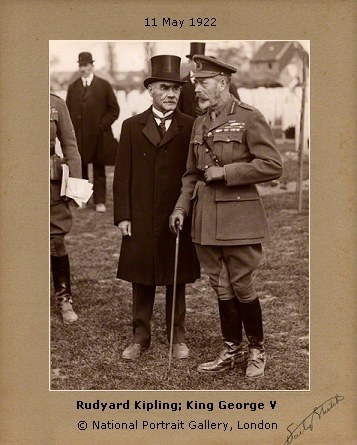





|
"The Book of The King's Jubilee" Edited by: Sir Philip Gibbs, KBE. Published by: Hutchison & Co. Ltd. London 1935 "This book, with its story of the King's life and reign and many pictures of historical interest, will be kept, I am sure, in great numbers of homes, not only in this country but throughout the Empire, as a memorial of the Jubilee year, which will be celebrated with real gratitude by all the King's family of nations. That gratitude is more than the traditional loyalty of the British peoples to the Crown, which is the symbol of their unity and of many sentiments deep-rooted in the past. It has the touch of personal warmth, among many races, creeds and casts. It is gratitude and affection for a King-Emperor who, in weal and woe, has been steadfast in service and goodwill to the common crowd - all these millions - having their interests at heart and sharing their gladness and griefs. His reign will be remembered always in history because of the [First] World War and all the agony it caused. During that time the King played his part with a courage and sympathy which were recognised somehow by the whole people. Many crowns fell into the dust, many kings departed, but when peace came King George stood on his balcony and looked down on vast cheering crowds among whom were many of his soldiers, and he knew that he held the loyalty of his folk. He holds it because of certain qualities of character which we like to think are very English - in simplicity, in honesty, in sense of duty, and, perhaps one may add, in sense of humour."  the One Hundred and Thirty-fourth anniversary of the birth of King George the Fifth. Here is an interesting 1905 quote from King George V, when he was still Prince of Wales, concerning some observations made on his first India tour: "No doubt the Natives are better treated by us than in the past, but I could not help being struck by the way in which all salutations by the Natives are disregarded by the persons to whom they were given. Evidently we are too much inclined to look upon them as a conquered & down-trodden race & the Native, who is becoming more and more educated, realizes this. I could not help noticing that the general bearing of the European towards the Native was to say the least unsympathetic. In fact not the same as that of superiors to inferiors at home." There is about that an air of innocent commonsense rarely found among very important personages. But then, George V, though not indifferent to regal dignity, was not an important personage to himself. FROM: J. B. Priestley, "The Edwardians". Published 1970 - Heinemann London  George V was the second son of Edward VII. His mother was Alexandra of Denmark, sister of Empress Marie of Russia. He joined the Royal Navy aged 12 and served until 1892 when he became heir to the throne on the death of his elder brother Albert, Duke of Clarence, who died of pneumonia. In 1893, he married Princess Victoria Mary of Teck (known as ‘May’ to her family) who had previously been engaged to his brother. They became Duke and Duchess of York and lived on the Sandringham Estate, in Norfolk. The marriage was a success and George unlike his father never took a mistress. They had 6 children Edward, Albert, Mary, Henry, George and John. The youngest Prince John suffered from epilepsy and died aged 13. He became King George V on the death of his father Edward VII in 1910, and Mary became Queen consort. They toured India in 1911 as Emperor and Empress of India. During World War I he made several visits to the front, and Mary visited wounded serviceman in hospital. She was staunch supporter of her husband during difficult times that included not only the war with Germany, but also the Russian revolution and murder of George’s cousin Princess Alix who was Tsarina Alexandra wife of Tsar Nicholas II, civil unrest including the General Strike in England, the rise of socialism, and Irish and Indian nationalism. George V has been criticised for not rescuing the Russian Royal family but at the time there was serious concern that it would incite a similar revolution in the UK. He sent a ship in 1922 to rescue the Greek Royal family including 1 year old Prince Philip now the Duke of Edinburgh. In 1917 with anti-German sentiment running high, he changed the family name from Saxe-Coburg-Gotha (popularly known as Brunswick or Hanover) to Windsor, and he relinquished all German titles and family connections. George V enjoyed stamp collecting and although considered dull by biographers he became by his Silver Jubilee in 1935 a much loved King. In 1932 he started the tradition of the Royal Christmas broadcast which has continued ever since. His relationship deteriorated with this eldest son Edward (later Edward VIII) when he failed to settle down and had affairs with married women, but he was fond of his second son Albert (“Bertie” later George VI) and his granddaughter Elizabeth (later Elizabeth II) whom he called ‘Lilibet’. She called him ‘Grandpa England’. He died of pleurisy in January 1936. Excerpted from: Royal Family History Site |


 Click HERE For MORE King George V PHOTOS
Click HERE For MORE King George V PHOTOS Click HERE For two PHOTOS of King George V
Click HERE For two PHOTOS of King George V Click HERE
For a selection of Great War Posters
Click HERE
For a selection of Great War Posters







The George Cross
Chancery of the Orders of Knighthood
The Official Website of the British Monarchy














